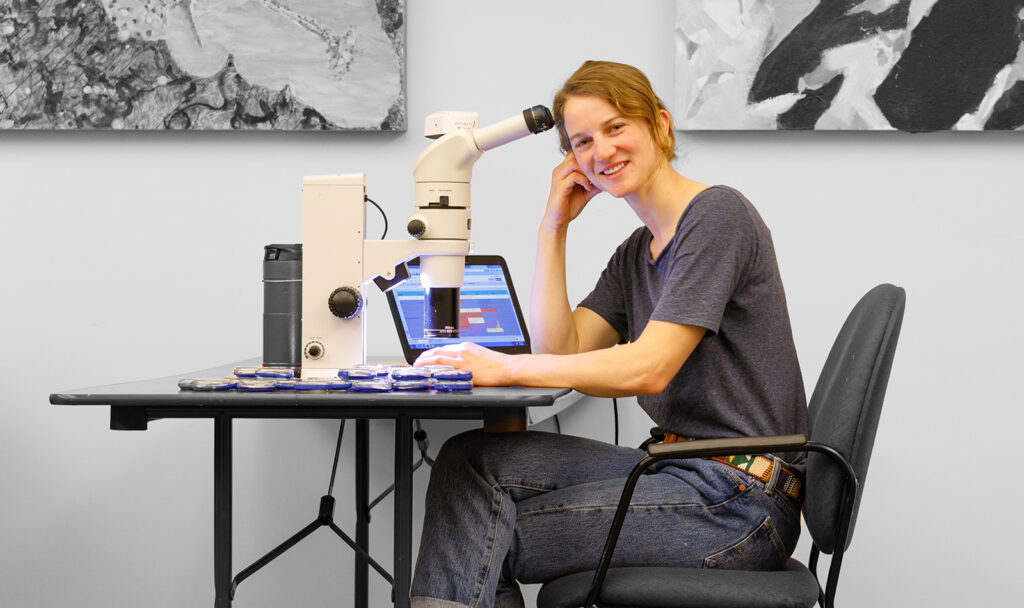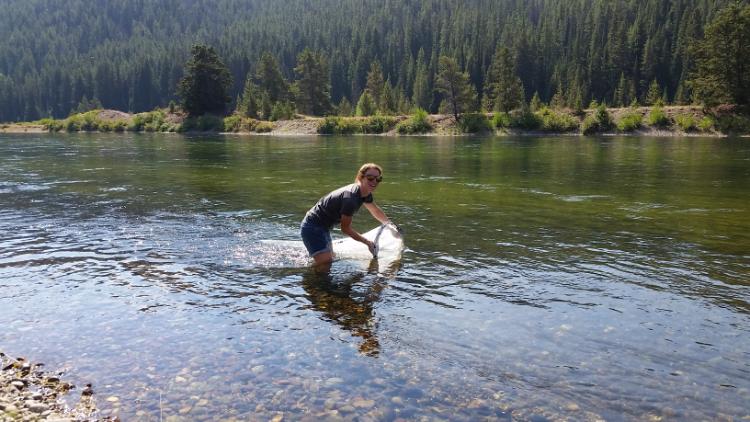Home / News / 2020-2021 News / TAKING COURSES FOR FUN AT CWC LEADS ONE ALUMNA TO A NEW CAREER PATH
TAKING COURSES FOR FUN AT CWC LEADS ONE ALUMNA TO A NEW CAREER PATH
Home / News / 2020-2021 News / TAKING COURSES FOR FUN AT CWC LEADS ONE ALUMNA TO A NEW CAREER PATH
TAKING COURSES FOR FUN AT CWC LEADS ONE ALUMNA TO A NEW CAREER PATH

Ellen Yeatman never expected her Central Wyoming College experience to have such an impact on her career.
As a baccalaureate alumna from Washington and Lee University in Virginia, Yeatman moved to Wyoming in 2014 and started taking night classes at Central Wyoming College in Jackson for fun. It was Dr. Metcalf’s microbiology course that captured her interest first.
“My success in this class and others opened the door to many opportunities, and truly put me on a track that I could not have attained or found without CWC’s help,” she said.
Little did she know, she would soon be performing groundbreaking research. Through Metcalf, Yeatman met professor Kirsten Kapp, who hired Yeatman as a research assistant. Together, they analyzed the Snake River for evidence of microplastic pollution.
“I learned so much from Professor Kapp about field work and rivers and the power of the scientific method,” she said. “Despite having been an aspiring scientist for several years, it was the first time I had a female scientist mentor.”
While Yeatman worked with Kapp, the pair took a road and camping trip from Grand Teton National Park to Boise to collect river samples at 50-mile intervals using filters.
“We had so much fun finding little state parks to camp in,” Kapp said. “And not all of our designated sampling spots turned out to be ideal, so we had to think and reroute on our toes.”
Kapp said Yeatman played a key role in problem solving and organizing the project.
Most of the fun happens in the field, and most of the gruelling work happens in the lab, often at night and on weekends. Ellen was instrumental, particularly when I was strung out teaching classes and trying to complete the project. ”
Kirsten Kapp, professor of biology and math
Yeatman helped inspect the filters under a stereoscope. After photographing, measuring and classifying positive microplastic samples, the team then charted high pollution hotspots on a river map.
While the lab findings eventually became one of the first published studies to sample the entire length of a United States river, it is the in-field work Yeatman remembers most fondly.
“There was a lot of laughing, screaming, almost crying and gas-station boiled eggs and junk food,” she said. “We could always fall back on listening to Elephant Revival,which Professor Kapp and I both love, to keep our spirits high.”

As Kapp explained, this kind of project requires quick thinking, flexibility and the ability to stay calm.
“Ellen has all of those qualities, plus a sense of adventure too,” she said. “I am glad that this experience served as a stepping stone for Ellen as she learned where her true academic interests lie.”
In 2017, Kapp helped Yeatman secure a summer job as part of the Water Quality research team at the Department of Environmental Quality. She collected, analyzed and reported chemical, biological and physical data for Fish Creek as well as the Popo Agie, Big Sandy and Green Rivers.
Yeatman ultimately transferred to the University of Wyoming, where she is finishing her thesis research on the ecological and economic effects of a water-use demand management program in the Green River Basin.
“This May, I will graduate with my M.S. in Agricultural and Applied Economics with a focus in water resources,” she said. “I am a physical scientist turned social scientist and I love it.”
Yeatman is currently applying for water resource economist positions across the intermountain west.
“My career goal is to start a land and water policy institute in Wyoming,” she said.
2660 Peck Avenue
Riverton, WY 82501
(307) 855 – 2000
Campus Map
120 Enterprise Blvd.
Lander, WY 82520
(307) 332 – 3394
Campus Map
240 S. Glenwood St #124
P.O. Box 4795
Jackson, WY 83001
(307) 733 – 7425
Campus Map
302 W. Ramshorn
P.O. Box 175
Dubois, WY 82513
(307) 455 – 2625
Campus Map
© 2024 Central Wyoming College – All Rights Reserved